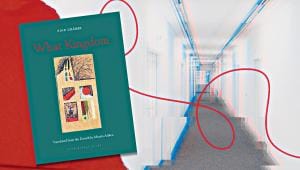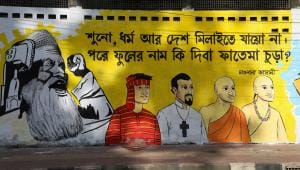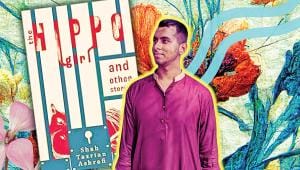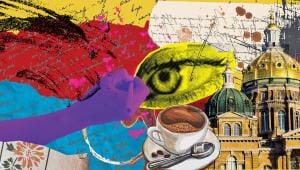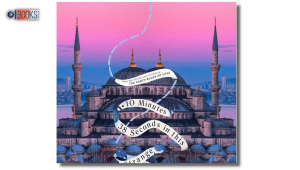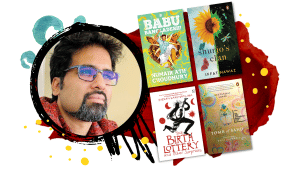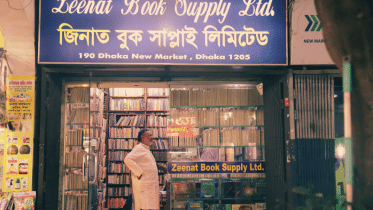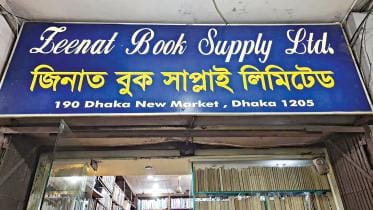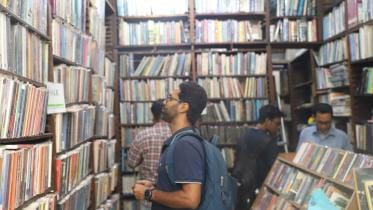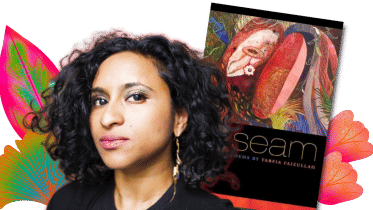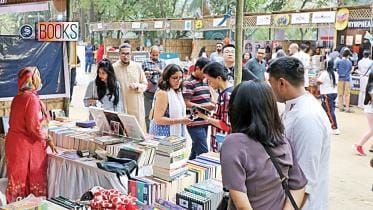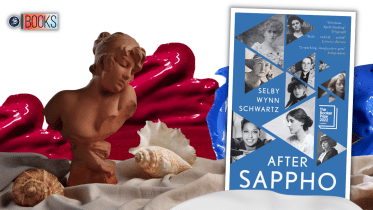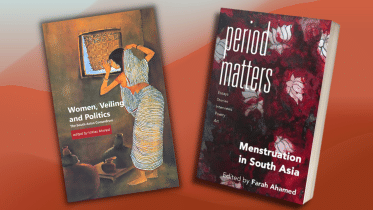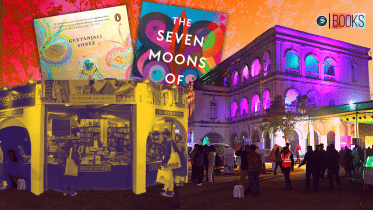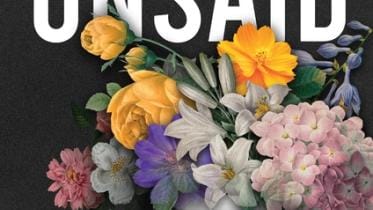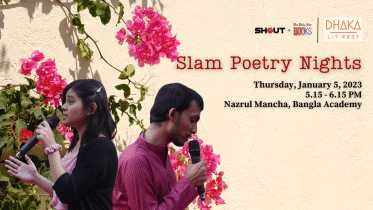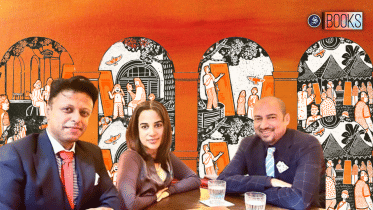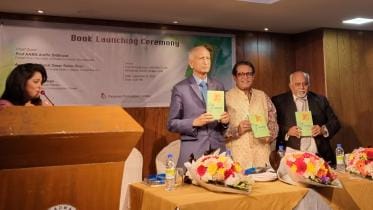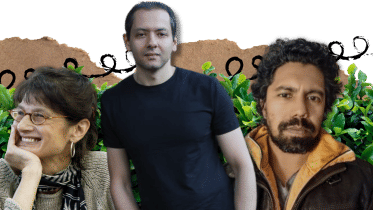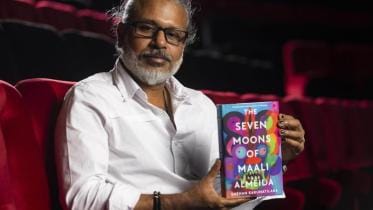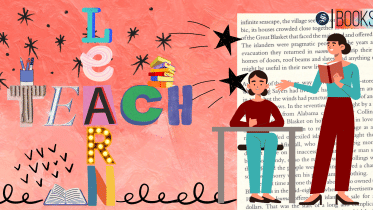A bookstore is a time machine—Zeenat Book Supply through the ages
Last week, one of Dhaka’s oldest bookstores announced that they will be closing shop after running for 60 years
20 April 2023, 03:59 AM
Zeenat bookstore shuts its doors after 60 years
Zeenat Book Supply, a New Market staple for book lovers since 1963, will close shop on May 1, 2023.
13 April 2023, 18:00 PM
Piracy a main reason for New Market’s Zeenat bookstore closing down
Zeenat Book Supply, a New Market staple for book lovers since 1963, will close shop on May 1, 2023.
13 April 2023, 10:34 AM
The Birangona in poetry and conversation
Using a Fulbright fellowship, Tarfia decided to come to Bangladesh to research the war and interview the women whom the Bangladesh government, in 1972, titled Birangona (war heroines). These interviews resulted in 'Seam' (Southern Illinois University Press, 2014).
25 March 2023, 08:53 AM
The pleasure of knowing your neighbourhood
Safe, vibrant public spaces are so rare in Dhaka that the months from January to early March feel like a gift from the universe when the Bangla Academy comes alive with the Dhaka Lit Fest, followed by the Dhaka Art Summit and the February extravaganza of the Ekushey Boi Mela. Since 2020, the Gulshan Book Fair has added to the series of treats for those of us who crave creative festivals in this city.
12 March 2023, 18:00 PM
A legacy of women's freedom in art
Schwartz’s narrator speaks in the choral “we”, and like a daisy chain, they connect all these women’s shared yet individual experiences of feeling closed in, being violated, feeling misunderstood by society, until they all shed their names and managed to “escap[e] the century”.
9 March 2023, 00:15 AM
4 nonfiction books that unpack South Asian feminism with nuance
The collection comprises essays, poetry, short fiction, feature pieces, interviews, research reports, and photographs and artwork that explore the physical, psychological and political experiences of menstruation across South Asia.
9 March 2023, 00:00 AM
The books you will meet at Dhaka Art Summit 2023
For those who are especially interested in literature in book form, the first two floors of the exhibition hold treasures.
9 February 2023, 13:31 PM
Foreign literature is a very precious tool for peace
Daily Star Books’ panel on January 8, Day 4 of the Dhaka Lit Fest sought to take the audience to a more existential aspect of what the festival attempts to do. Who chooses which stories deserve to become books? Who chooses whether news of those books will even reach readers? Does book criticism truly help the flow and business of literature within and across national borders?
13 January 2023, 18:00 PM
Three literary walks: Nilanjana Roy, Shehan Karunatilaka, Daisy Rockwell
With a Books page you're creating a running history of the ideas and the parallel history or the imagination of a country.
12 January 2023, 11:07 AM
FIND US AT DHAKA LIT FEST THIS WEEK!
Media platforms that critique literature are, therefore, at the heart of the book ecosystem. They shape a book’s public perception and can bolster (or destroy) sales.
7 January 2023, 12:59 PM
5 new books to start the new year with
Someone has to pay the price when traditions, community beliefs, and environmental issues are unheeded.
5 January 2023, 05:05 AM
On curating Slam Poetry Nights for Dhaka Lit Fest tomorrow
The most moving part about these poetry sessions is the conversations.
4 January 2023, 15:05 PM
Behind the scenes of the Dhaka Literary Festival 2023
Literature is our main area of interest.But we also want to highlight areas of intersection between literature and science, politics, pop culture, human rights, and new media.
15 December 2022, 04:37 AM
Journalists need regular salaries, institutional support, says Nadeem Qadir at book launch
Qadir’s book includes insight on the origins and evolution of journalism in Bangladesh, firsthand experiences of journalists who have struggled and resigned from large media houses, research and case studies, and proposed solutions.
11 December 2022, 06:53 AM
Unpacking the craft of creative writing
If you are reaching out to an agent, go and find out exactly what sort of work that agent publishes. Also, think in terms of what would differentiate your work with the work of 39 other authors.
3 December 2022, 12:05 PM
In Iffat Nawaz’s debut novel, 1971 is not an open wound
Shurjo’s Clan uses magic realism to conjure Shurjomukhi’s freedom fighter uncles, who were martyred in Sylhet’s tea gardens during the 1971 Liberation War, and her grandmother, who took her own life shortly after the 1947 Partition.
18 November 2022, 07:34 AM
Sri Lankan author Shehan Karunatilaka wins Booker Prize 2022
The novel opens with a photographer, the eponymous Maali Almeida, who has woken up dead in a celestial visa office, while his body sinks in the Beira Lake in Colombo. Maali has seven moons to find the man and woman he loves and lead them to "a hidden cache of photos that will rock Sri Lanka".
18 October 2022, 05:38 AM
‘Sultana’s Dream’ in new Penguin Classics edition and audiobook
The Penguin Classics edition of Sultana’s Dream and Padmarag comes in a paperback, ebook, and as an audiobook narrated by Priya Ayyar, a television and film actor and award-winning audiobook narrator with a BFA and MFA from NYU's Tisch School of the Arts.
12 October 2022, 11:43 AM
On the chaos of teaching English
I discover that teaching is more about reading people.
5 October 2022, 12:18 PM




